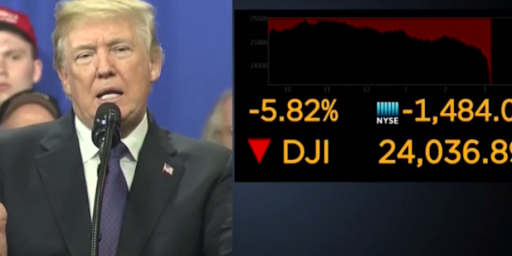When Arnold Kling Gets Angry
Well I don’t know if he is angry, but he sure does stick it to those who argue in favor of greater government control. I’m going to post his entire post here since I figure many will be too lazy to click through.
Tyler Cowen puts a lot of the blame for the financial crisis on leverage. He links to Robert Frank, who writes,
In financial markets, asset bubbles cause real trouble when investors can borrow freely to expand their holdings. To prevent such bubbles, we must limit the amounts that people can invest with borrowed money.
I want to extend the point to cover government, where the chief characteristic is playing with other people’s money. Big Finance and Big Government have much in common. Both are coveted by Harvard graduates. Both are characterized by an arrogant sense of entitlement and importance.
Instead of thinking of the pending bailouts and financial regulation as a new era of government supervisions of markets, think of it as preserving the system in which a Harvard elite controls other people’s money. In fact, very little is likely to change. Reading the news stories about how Secretary Paulson plans to implement the bailout, it seems as though the same people will be in charge of the money. Print some new business cards, change the logo on the front from “Goldman Sachs” to “U.S. Treasury,” and everything else continues as it was. It’s just that it becomes a lot more difficult for ordinary people to opt out of using the elite’s money management services.
That is exactly right. If anyone objects to the notion of leverage as “playing with other people’s money”, then by the same logic they have to object to government…virtually all of it since the entire budget and every penny the government spends is other people’s money. If playing with other people’s money makes one irresponsible then the most irresponsible people in this country are the President, every Senator, every Representative, every state and elected official and every single bureuacrat. They are playing with other people’s money and based on the current financial crisis and the state of the economy they are doing a pretty crappy job of being responsible. American politicians, and politicians in general, are not wise, courageous leaders who make tough choices during crises. They are the exact opposite, they are foolish, and cowards who take the easy road during a crisis lest they lose the one thing they crave the most, the power they have aquired. I find them all to be loathesome.





I have to say my response to this post is…Eh?
The original post by Franks is a worthwhile article about why market forces didn’t contain the current housing bubble and following credit crisis.
The follow up post by Cowen states everything was caused by the fact some investors were stupid and some businessmen are con-men. He puts in a throw-away line about how to help eliminate the con-men.
Kling puts up a mostly irrelevant rant about how some money managers are Ivy Leaguers (I’m assuming he isn’t against just people from Harvard.) and how the bailout is won’t change anything (to which I say “Du-uh.”, nothing is going to change while the same people are in power.)
You take this rant and use it as a reason to rant against government.
You could have saved a lot of time by saying, “I don’t trust government because I think they are all crooks.”
Thanks for getting us to the original article though…
The entire system of credit at all is playing with other people’s money. This post represents the worst side of Libertarianism: Really freaking stupid, but it sure makes a good slogan!
There are some who would disagree with you on this, starting with Abraham Lincoln: “that government of the people, by the people, for the people, shall not perish from the earth.” I think old Abe would consider it, us playing with our money… You know, on little things like roads, bridges, defense, police protection, etc.
Now if you were talking about just the deficit I could go along with it being “playing with other people’s money” by virtue of the fact that we are taking from future generations to pay for what we get now.
But you clearly weren’t talking about the deficit.
Great saying, but not entirely true. A more accurate way to put it is,
“…that government of the majority, by the majority and for the majority….”
For example, I think the current bailout is bad policy. I don’t think it will work and will be a waste of money, and it will likely lead to another bailout and even more money being spent. But using your logic, I’m partly responsible? Sorry, not buying it.
Right, and given that you think spending up to the point of incurring a deficit is okay, can we infer that you support 100% earmarks and other pork barrel spending?
carpeicthus,
I don’t actually mind credit in general. After all, the person loaning the money does so at his choosing and, understands the risks. On the other hand, the control voters have over the government is imprecise and hard to bring to bear. For example, most people opposed the bailout, but with sufficient pork their elected representatives voted for it anyways.
Its really freaking simple, if you advocate for discretionary policy, you raise taxes during the expansion to cover the tax cuts during the recessions. However this almost never happens. But yet here we are again during an election year hearing how the candidates will save us when in reality they don’t intend to do anything of the sort. And I’m supposed to believe that these people are going to be responsible. Sorry.
C-Red,
There is lots of blame being put on leverage for the current crisis. The argument goes as follows,
1. If you make and investment, say $100 and it goes up by 10% you make 10%, or $10.
2. If you use leverage and purchase a much larger share of the investment, say $3000, and it goes up by 10% now you’ve made, say, $285 which is almost 30x the initial return!
3. Get enough people doing #2 and it can lead to inflated prices for these investments.
4. Eventually the bubble bursts and we have a mess.
Okay, fair enough. That is a problem hence the “playing with other people’s money” and irresponsibility arguments. But government is playing with other people’s money too: the taxpayers money. It gets spent on stupid shit like bridges to nowhere, corporate welfare, subsidizing biofuels which ratchet up food prices and produce little or no benefit in terms of savings in regards to energy. Not only are politicians spending the money they take in today, they’ve made promises to spend tens of trillions (in todays dollars) in the future! Sure the current financial mess is going to be expensive, but compared to Medicare…bah, its nothing.
But I’m confused? Do you pay attention at all to current events? Did you see Obama and McCain dodge the question on Medicare?
Just curious.
The point is not “playing with other people’s money.”
The point is 20:1 or 30:1 leverage where it’s obvious that a sharp downturn jeopardizes the whole house of cards.
Used to could say, we’d trust the free market to restrain people from excessive leverage, but that doesn’t seem to work too well any more.
Arnold Kling is a highly intelligent, very well informed economist.
It is really a shame to see a great mind like his go to waste because of his ideological blinkers.
this is true only if one ignores little things like the Senate where it takes a “super majority” to move a bill forward, or the Bill of Rights and the courts that enforce them. These are hardly perfect institutions and we can both find plenty wrong with them. But as the saying goes, Democracy is a horrible way to run a country… except for every other. Seeing as you find all who serve in gov’t loathsome, do you find gov’t loathsome too? And if so, what would you prefer? Anarchy?
Quite a leap of logic there Steve. I wouldn’t buy it either. I am not an economist. Hardly know enuf to comment one way or the other about the current bailout plan to say anything. So I said nothing about it to my congress people other than to complain about the “sweeteners”. (loved that word, didn’t you? heavy sarcasm) As one who knows too little I leave it to people like you and others to educate me and congress about the good/bad of the bail out. You fought the bail out (as best you could) and “lost” the battle. The only way you could be resonsible for it’s passage is if you were all powerful. I never thought that. I, however, said nothing about the basic bailout because I was getting too much conflicting information. I should have been a little better informed. Therefor I AM a little bit responsible. That is MY logic, Steve.
That would be quite another leap of logic if it were true Steve (honestly, I don’t know where you get this stuff). When my granddaughter was born, she was already $32,000 in debt. That pisses me off. And eliminating it should be the primary goal of any fiscal policy our gov’t comes up with. Earmarks are about the only thing I agree with John McCain on. If a project is worthwhile, let it come up in committee where it’s pros and cons can be hashed out.
As to “pork barrel spending”… One man’s pork, is another man’s bacon. I hardly think of the road in front of my house, the city water I use, the police protection I get, the schools I sent my sons to, etc, as pork. They are necessary expenditures by gov’t that allows the society within which I live to work. And I pay taxes for that purpose. I don’t always like it, and I don’t alway agree with what is done with it, but that is the societal pact we live under.
In the meanwhile, keep up the good fight on the economy and I will try to keep learning from you.